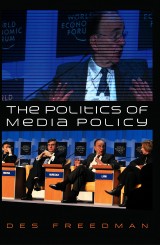Details

The Politics of Media Policy
1. Aufl.
|
18,99 € |
|
| Verlag: | Wiley |
| Format: | |
| Veröffentl.: | 22.04.2013 |
| ISBN/EAN: | 9780745674513 |
| Sprache: | englisch |
| Anzahl Seiten: | 264 |
DRM-geschütztes eBook, Sie benötigen z.B. Adobe Digital Editions und eine Adobe ID zum Lesen.
Beschreibungen
<i>The Politics of Media Policy</i> provides a critical perspective on the dynamics of media policy in the US and UK and offers a comprehensive guide to some of the major points of debate in the media today. While many policymakers boast of the openness and pluralism of their media systems, this book exposes the commitment to market principles that saturates the media policy environment and distorts the development and application of democratic media policies.<br /> <p>Based on interviews with dozens of politicians, regulators, special advisers, lobbyists and campaigners, <i>The Politics of Media Policy</i> considers how governments, civil servants and media corporations have shaped the drawing up of rules concerning a range of issues including:<br /> <br /> </p> <ul> <li style="list-style: none"><br /> </li> <li>Media ownership<br /> </li> <li>Media content<br /> </li> <li>Public broadcasting<br /> </li> <li>Digital television<br /> </li> <li>Copyright<br /> </li> <li>Trade agreements affecting the media industries.</li> </ul> The book identifies both the institutions and the arguments that dominate the development of these crucial media policies. It will be of interest to public policy and media professionals, researchers, activists and students indeed all those determined to understand and respond to the impact of neo-liberalism on the contemporary world.
<p>Preface vii</p> <p>1 Introducing Media Policy 1</p> <p>2 Pluralism, Neo-liberalism and Media Policy 24</p> <p>3 The Reinterpretation of Media Policy Principles 54</p> <p>4 Dynamics of the Media Policymaking Process 80</p> <p>5 Media Ownership Policies 105</p> <p>6 Media Content Policies 122</p> <p>7 The Disciplining of Public Broadcasting 147</p> <p>8 The Politics of Digital 171</p> <p>9 Britain and America in the World 198</p> <p>10 Conclusion 217</p> <p>References 226</p> <p>Index 253</p>
"Very highly recommended. This agenda-setting introduction to media policymaking deserves to become a core text." <br /> <b><i>Times Higher Education</i></b> <p>"A highly insightful analysis of how to do media policy studies in original and significant ways."<br /> <b><i>Australian Journalism Review</i></b></p> <p>"Des Freedman has written a wonderful, original and indispensable introduction to the exploding world of media policy making. It deserves the attention of students, scholars and citizens everywhere."<br /> <b>Robert W. McChesney<i>, University of Illinois at Urbana-Champaign</i></b></p> <p>"Well-written, comprehensive and passionate, this will be a key book on media policy."<br /> <b>David Hesmondhalgh,</b> <i><b>University of Leeds</b></i></p> <p>"For many years, the study of media policy has lacked the thick description of personal observation. Previous work has either been caught in the detail of the law, or been distanced by the abstraction of academic theory. Now we have a book that brings all these important discourses together, thanks to Des Freedman's fresh, interdisciplinary approach."<br /> <b>Toby Miller, <i>University of California, Riverside</i></b></p>
<b>Des Freedman </b>is Senior Lecturer in Communications and Cultural Studies at Goldsmiths College.
<i>The Politics of Media Policy</i> provides a critical perspective on the dynamics of media policy in the US and UK and offers a comprehensive guide to some of the major points of debate in the media today. While many policymakers boast of the openness and pluralism of their media systems, this book exposes the commitment to market principles that saturates the media policy environment and distorts the development and application of democratic media policies.<br /> <p>Based on interviews with dozens of politicians, regulators, special advisers, lobbyists and campaigners, <i>The Politics of Media Policy</i> considers how governments, civil servants and media corporations have shaped the drawing up of rules concerning a range of issues including:<br /> <br /> </p> <ul> <li style="list-style: none"><br /> </li> <li>Media ownership<br /> </li> <li>Media content<br /> </li> <li>Public broadcasting<br /> </li> <li>Digital television<br /> </li> <li>Copyright<br /> </li> <li>Trade agreements affecting the media industries.</li> </ul> The book identifies both the institutions and the arguments that dominate the development of these crucial media policies. It will be of interest to public policy and media professionals, researchers, activists and students indeed all those determined to understand and respond to the impact of neo-liberalism on the contemporary world.


















